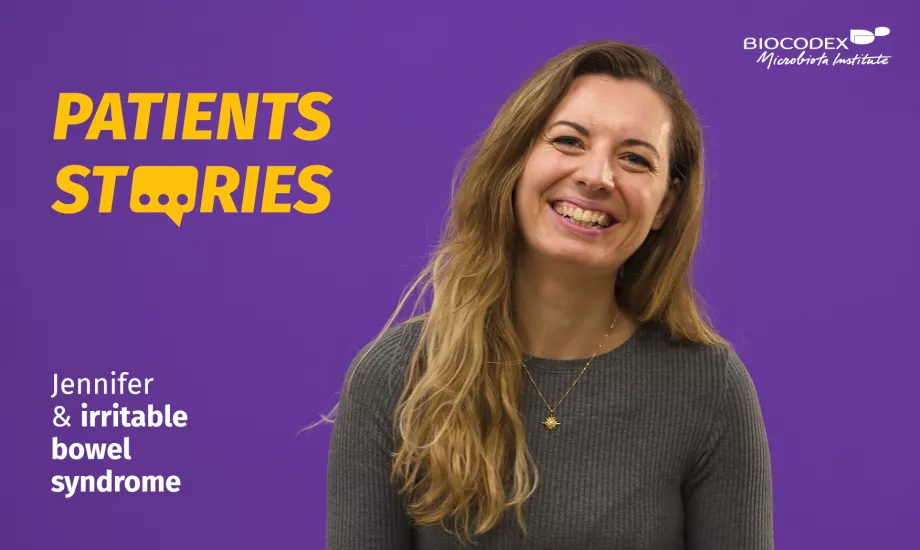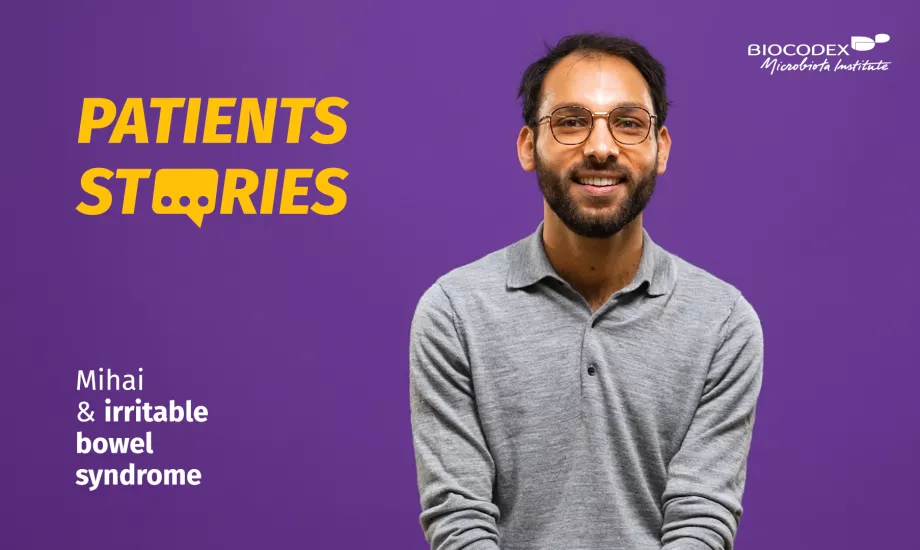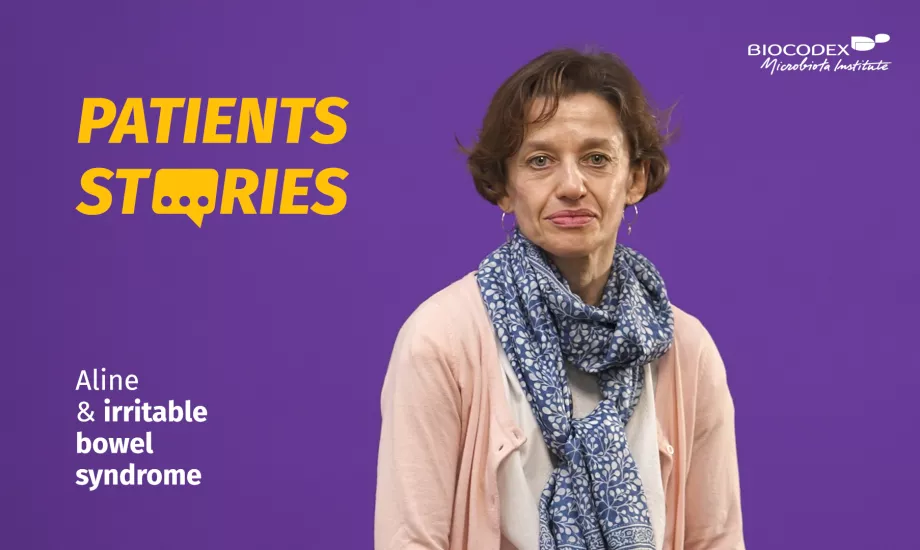Patients stories: living with Irritable Bowel Syndrome (IBS)
PATIENTS STORIES: the Biocodex Microbiota Institute provides patients with a platform to share their stories, describe their daily lives, and give advice on how to live with the illness.
- Learn all about microbiota
- Microbiota and related conditions
- Act on your microbiota
- Publications
- About the Institute
Healthcare professionals section
Find here your dedicated section
Sources
This article is based on scientific information
Sections

About this article
This new format is dedicated to irritable bowel syndrome (IBS). It’s estimated that 10% of people suffer from IBS, but 75% of those affected by the disease remain undiagnosed. This is because the disease cannot be explained by any detectable physical anomaly.
The first episodes in our series have been produced with the support of the French Association of Irritable Bowel Syndrome Patients (APSSII).
52% Just 1 in 2 people having suffered from a digestive condition involving the microbiota had made the connection

Jennifer’s story
Jennifer is 32 years old and works as a product manager in the fashion industry. She was diagnosed with irritable bowel syndrome at the age of 29, after 21 years of wandering between health professionals.

My name is Jennifer, I’m 32 years old and I work as a product manager in the fashion industry.
Can you explain what is irritable bowel syndrome?
Irritable bowel syndrome is a chronic, invisible, and misunderstood digestive disorder.
What were your symptoms?
I had constipation that felt like daggers in my stomach, pain, spasms, nausea, and occasionally diarrhea. I also suffered from chronic fatigue.
My first symptoms, surprisingly, were food allergies, while I also developed Raynaud’s syndrome, where blood no longer circulates to extremities (hands and feet), leaving them extremely cold.
I had back pain that forced me to wear a corset belt at the age of 25.
How long did it take to get diagnosed?
I had these symptoms for 21 years before being diagnosed at the age of 29.
What made you seek medical advice?
I woke up one morning still extremely tired and very late for work. And I suddenly collapsed.
Where did you look for advice about your symptoms?
At first, I sought advice from my family doctors and gastroenterologists, but the answers were always the same: since I had been acutely constipated at the outset, they prescribed me lots of laxatives and didn’t look into it any further. I also saw rheumatologists but got no real answer until the last gastroenterologist told me about IBS and FODMAPs.
What are FODMAPs?
FODMAPs are fermentable sugars in food. For people affected by IBS, they can be a problem.
Did you know that the gut microbiota may be involved in IBS?
I knew my microbiota was involved as soon as the gastroenterologist told me that my diet was part of the problem. As soon as I changed to a low-FODMAP diet that replenished my microbiota, literally all my symptoms disappeared.
What’s it like living with IBS on a daily basis?
I manage the illness on a daily basis by maintaining a healthy lifestyle. I make sure to sleep well, I’m careful about what I eat, and I try to avoid as best I can any unnecessary stress that could affect my stomach and, therefore, my head.
What do you know about the gut-brain link in IBS?
I think IBS shows that the head and stomach are intricately linked. For me, the gut is even a precursor to the brain. When things go wrong in the stomach, they’re bound to go wrong in the head.
What message do you have for people with IBS?
I’ve so much advice for people with IBS that I’ve created a blog called foodmapers.com where you can find everything I have to share.
Listen to your own body, trust yourself. It’s not in your head. If you feel there’s something wrong, it may be due to your microbiota and the way you digest food.
I’ve been there. You can’t go on having x-rays and ultrasounds for another twenty years only to be told there’s nothing wrong. There must be something going on. And once it’s been diagnosed, there are plenty of things you can act on in terms of diet, stress and anxiety, and sleep.
In conclusion
Stay positive, but above all keep searching, don’t give up, and find health professionals who can support you and help find what’s wrong.
-
Jennifer's blog FOODMAPERS
-
Jennifer's podcast LES DIGÉRABLES

Mihai's story
Following a period of acute appendicitis, Mihai, 25, developed irritable bowel syndrome. He tells us how his daily life has been turned upside down since diagnosis, and discusses the constraints he now faces.

Hi, my name is Mihai, I’m 25 years old. I’m a secretary in a retirement home and I suffer from irritable bowel syndrome.
Can you describe irritable bowel syndrome?
IBS is a disease that affects the digestive system. It is benign.
What were your symptoms?
Stomach pain, bloating, swelling. I wasn’t able to eat or drink what I wanted to anymore. My stomach rumbles, vibrates. It feels like I have a phone in my pocket and I lost 35 kilos in six or seven months.
What made you seek medical advice?
I developed IBS following acute appendicitis. I suddenly started having stomach pains. I had a lot of tests and visited the emergency room. They put me through various treatments but none worked.
How long did it take to get diagnosed?
Between 2016 and 2022, I saw six gastroenterologists and then went back to the emergency room, where an intern told me “Well, I know what’s your problem, you have irritable bowel syndrome.”
Where did you look for advice about your symptoms?
I looked for information from associations, like the French Association of Irritable Bowel Syndrome Patients (APSSII), where I’m currently a member, and also on Instagram and other social networks.
The microbiota’s role?
I knew the microbiota was involved thanks to videos on the gut microbiota and information from associations such as the APSSII. I had videocalls with people who have the same problem and they spoke to me about the gut microbial flora.
What’s it like living with IBS on a daily basis?
IBS is difficult to live with on a daily basis. I can’t take public transport anymore. I have to cancel nights out with friends because it prevents me from having fun. There are days when I want to do things, but can’t because my stomach tells me otherwise. I work and try to have a normal life but it’s complicated.
What message do you have for people with IBS?
It’s about seeking advice and eating as well as possible given the circumstances. I’ve learned to live with the stress.
I feel relaxed now but I need to listen to my body and what I feel. That’s the most important thing, listening to your body.

Aline's story
Aline, 50, has suffered from Irritable Bowel Syndrome since childhood. Despite the difficulties in her daily life, she has now learned to live with the disease to lead the most normal life possible.

My name is Aline, I’m 50 years old, I work as an environmental officer, and I suffer from irritable bowel syndrome.
Can you describe irritable bowel syndrome?
IBS is a group of symptoms that affect the gut, and particularly the colon. These symptoms include pain, bloating, constipation or diarrhea, or an alternation between the two, depending on the patient.
What triggers the attacks?
For me, it was above all a visceral hypersensitivity. Any kind of stress or anxiety, any psychological discomfort often result in colic, cramps, or pain, and you have to learn to adapt and live with these symptoms as best you can.
Can you share an anecdote with us?
Once, on seeing me, a shop cashier confidently said: “ladies and gentlemen, please let the pregnant lady through”. I was the pregnant lady.
How were you diagnosed?
The doctor was unsure about the diagnosis and the treatment. All through my childhood and adolescence the doctors talked about sensitive gut, colopathy, or spastic colitis. But the term “irritable bowel syndrome” came very late. I must have been about thirty, if I remember correctly.
Where did you look for advice about your symptoms?
I learned quite a lot by myself, thanks to the French Association of Irritable Bowel Syndrome Patients (APSSII), its conferences, and annual events. Even if I can’t get an answer for everything, I really need to understand the illness and play an active role in overcoming it.
The microbiota’s role?
The microbiota is a community of 10 trillion bacteria, fungi, and archea that provides multiple services to the gut. It also helps the body as a whole thanks its role in digestion. From the digestion of fibers in particular to the production of certain vitamins and the development of the immune system. The gut and the brain communicate via the vagus nerve. In my case I think it’s an express route because the information seems to travel very, very fast. So it really plays a major role in the health of the gut and in human health in general.
What’s it like living with IBS on a daily basis?
I won’t lie, it’s not always easy. I try to lead as normal a life as possible. I don’t want to let it restrict me to a solitary life at home, which would certainly be worse.
What message do you have for people with IBS?
Above all, IBS patients should avoid isolating themselves, should be open about their illness and should seek help from doctors and specialists.
They should live as normal a life as possible, with as few prohibitions as possible.
What is Irritable Bowel Syndrome?
Please note
The Biocodex Microbiota Institute’s goal is to educate the general public and healthcare professionals about the human microbiota. It does not provide medical advice. Please consult a health professional for any questions or requests you may have.
BMI 23.03













